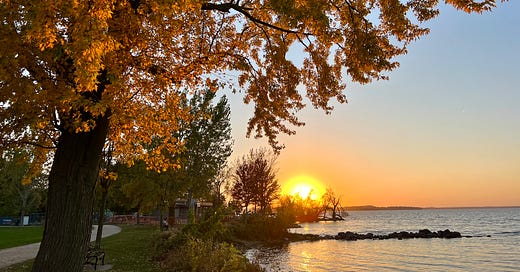The Opposite of Anxiety
What do you suppose would happen if people believed this crazy notion that the earth loved them back?
Last week, laying in relaxation pose after a nice yoga class, the teacher said something that I can’t stop thinking about. She was guiding us to let our muscles let go, our bones feel heavy, and the weight of our bodies truly rest on our mats. Then she said, “Some call it gravity. Some call it love.”
I got out of class and wrote in my journal: What if gravity is love from the earth?
These weeks leading up to the US election have been heavy. I am worrying about the future, worrying for my children, worrying about all the uncertainties while the weather outside just couldn’t be better — which is honestly worrisome in Wisconsin in October. But I keep thinking about that What if?
Robin Wall Kimmerer poses a similar question in her book, “Braiding Sweetgrass.” In an essay called ‘Epiphany in the Beans,’ she asks: “What do you suppose would happen if people believed this crazy notion that the earth loved them back?”
She describes her epiphany like this: “I looked around the garden and I could feel her delight in giving us these beautiful raspberries, squash, basil….It reminded me of my little girls’ answer to “How much do I love you?” “Thiiiiiiiiiiiis much,” with arms stretched wide, they replied.”
Then Kimmerer goes on to say: “I spend a lot of time thinking about our relationships with land, how we are given so much and what we might give back. I try to work through the equations of reciprocity and responsibility, the whys and wherefores of building sustainable relationships with ecosystems. All in my head. But [in the garden] there was no intellectualizing, no rationalizing, just the pure sensation of baskets full of mother’s love. The ultimate reciprocity, loving and being loved in return.”
What if gravity is the earth loving us? What if the stunningly beautiful display of fall color is a soothing hug before bed, a way of fueling “sweet dreams” through the winter?
When my brain wanders down this path, I can’t help but think about those wacky billionaires obsessed with breaking through the forces of gravity to rocket away from planet earth. Writer
studies predictions made many years ago in the context of modern life. He recently wrote a short essay called “What you can learn from just seven pages by Hannah Arendt.” I’ve never read anything by Arendt, a German-American philosopher called “one of the most influential political theorists of the 20th century,” so I appreciated Gioia’s quick introduction. According to his essay, on page one Arendt says that people who are disconnected with the human condition are obsessed with outer space and want to “escape man’s imprisonment to the earth.”Which gets me back to feeling the gravity of the moment, and searching for the love in it, too.









*Image of “Fall” by Mary Oliver from The Poetry Foundation website.
The old gold song of the almost finished year.
Robin Wall Kimmerer is a mother, scientist, decorated professor, and enrolled member of the Citizen Potawatomi Nation. I invite you to follow this link to read a short version of the essay I mentioned. If you haven’t read “Braiding Sweetgrass,” I think you’ll love it. But for those who have, the big news is that there is a new book available for preorder called “The Serviceberry: Abundance and Reciprocity in the Natural World!”
Keep finding the beauty friends.
Thanks so much for wandering,







Your poem with its reference to oaks made me think that Wendell Berry has a poem called The Sycamore. You know how fond I am of that tree. Here is how it starts:
In the place that is my own place, whose earth I am shaped in and must bear, there is an old tree growing, a great sycamore that is a wondrous healer of itself.
I thought you might like that line.
Dad
Thank you, Jessica. This really resonates with the anxiety I am feeling and the need to literally ground myself and get outside in the dirt.
On a similar note, I have carried a small slip of paper in my wallet, since my kids were babies, with this poem:
The Peace of Wild Things.
When despair for the world grows in me
and I wake in the night at the least sound
in fear of what my life and my children’s lives may be,
I go and lie down where the wood drake
rests in his beauty on the water, and the great heron feeds.
I come into the peace of wild things
who do not tax their lives with forethought
of grief. I come into the presence of still water.
And I feel above me the day-blind stars
waiting with their light. For a time
I rest in the grace of the world, and am free.
Wendell Berry